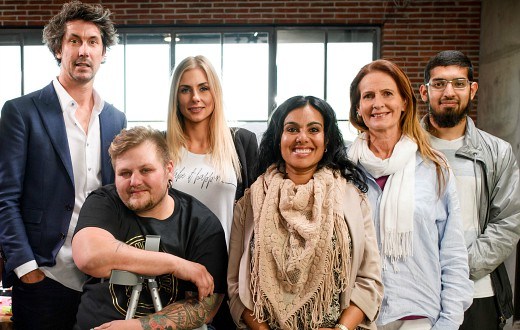
The Employables. It sounds like a show for struggling up and comers. You might expect to see some single parents, or young people getting their first jobs. You probably don’t expect the incredibly talented group of Autistic and other unusual individuals who make up the cast of this singular reality show. The idea of neurological variations isn’t new, but science has begun to recognize that a certain amount of variation is normal for humans. In short, normality as you think you know it is a myth.
The misunderstanding comes from growing up in an era when people are still learning how a human brain works. Think of it like being born when people were told the world was flat and then hearing about what Columbus found. It may be a while before the information is widely assimilated and accepted. You’re just ahead of the curve. We’ve carefully ferreted out some enlightening facts about the show, and it’s content to help you enjoy it even more.
1. Welcome to the Neuro-Diverse World
Most people probably honestly haven’t even heard the term Neurodiversity. If you don’t have a noticeably variable brain or a family member or friend who is openly identified as different, you wouldn’t necessarily ever hear the term. That’s more unfortunate than you know because neurodiversity is pretty common. Sadly, showing neurodiverse people in pop culture, literature, and education is extremely limited. You might easily liken it to showing homosexuality, or any other form of alternative preference on TV in say, the 1980s. Anyone different was just a ‘freak’ and a byline at best, and at worst ignored and ridiculed.
2. Breaking News, Women Are Neurodiverse People Too
Until very recently, women were never identified as having Aspergers and seldom classified on the Autism Spectrum. Differences in the way it manifests and what is considered ‘normal’ for a woman based on the gender bias caused decades of misunderstanding. Organizations like AWN (The Autistic Women and Nonbinary Network and shows like The Employables are helping create awareness of neurodiverse women. Instead of calling them ‘crazy,’ and pigeonholing them as something ‘men can’t understand,’ or isolating and even locking them up for permanent ‘treatment’ it’s becoming more common to ask questions about why that system never worked. Recognizing what the difference is has allowed the current generation of medical scientists to reclassify behaviors that were previously misunderstood.
3. Born This Way
The Employables follows in the footsteps of a show called Born This Way, which features people with Downs Syndrome. The saga of that show won Emmy Awards, and without it, The Employables might not be possible. Oddly, you might call The Employables a continuation of Born This Way. The people are different, and so are their challenges, but A&E is committed to providing an expanded and more realistic view of humanity. We think they deserve a whole lot more awards and credit than they get for that pursuit, but it’s nice to see them get some recognition.
4. Not Stupid or Crazy
Unquestionably, the two most common mistakes people make about the neurodiverse community is that they are stupid or crazy. While it’s entirely possible for a person to be both neurodiverse and lacking in intellect or clinically insane, that’s most often not the case. Just like everyone else, this is a ‘normal’ state for unique individuals. A person with Tourettes, for example, might say unexpected things, but the behavior isn’t related to any known form of insanity, it’s a result of the natural configuration of their brain. They aren’t dangerous or damaged, just further out from the expected.
Likewise, people on the Autism spectrum don’t always communicate well. They can have trouble reading social cues and other difficulties that mean they don’t always share what they’re thinking. Many actively avoid doing so. It’s not a lack of intellect, just a difference in the ability to share insights.
5. Neurodiversity in the 90s
Though people who vary from accepted norms have been around forever, so have the people who want to ‘cure them,’ which is a problem. You can’t cure a person from existing in their natural state. You can damage them and change things by force, but that’s not a cure, it’s trauma. The word Neurodiversity didn’t come into being until the 1990s. Before that, people didn’t really discuss how ‘normal’ can vary from person to person.
6. Harvard Agrees
The Harvard Business Review is well respected in the business world. Their stories cover numerous topics of interest to businesses. They ran a story back in 2017 to highlight how neurodiversity functions as an advantage for many employees. Supporting evidence from incredibly respected publications like the HBR helps show the value of neurodiversity and pave the way for incredible neurodiverse programs.
7. Facts and Figures
As much as it’s been hidden from public view, one in forty-two males and one in a hundred and eighty-nine females are on the Autism spectrum. That means there are millions of neurodiverse people in the world. Sadly, about 32% of them are employed versus the 77% of other adults (in the US). More than a gender gap or racial discrimination, being blatantly neurodiverse can stop an adult from being allowed to function as a regular member of society.
8. Not Seeking Sympathy
There is a considerable difference between recognition, accommodation, and sympathy. Sure, some people, regardless of who they are or how their brain works do seem to enjoy playing the sympathy card, but that’s the furthest thing from the minds of the people on The Employables. These brilliant and talented individuals don’t want to be treated differently, or at least no more so than someone who needs a ramp to get inside the building. They aren’t seeking a pity party. They’re seeking regular jobs with normal employers who recognize and value their talents.
9. Ahead of the Curve
You may not be surprised to discover that the first major corporations to start seeking neurodiversity are major technologies companies like Dell and Microsoft. The same forward thinking that embraces the future is where neurodiverse individuals are beginning to find a place they can do meaningful work. Likewise, those same companies are discovering that their You may not be surprised to discover that the first major corporations to start seeking neurodiversity are major technologies companies like Dell and Microsoft. The same forward thinking that embraces the future is where neurodiverse individuals are beginning to find a place they can do meaningful work. Likewise, those same companies are discovering that their new and different-thinking employees are a serious competitive edge because they think of things in ways others cannot.
10. Already Loved
No one can ever predict how viewers and reviewers are going to receive a new show. In the end, you write it, and you cast it, do the million small things that make it the best production you can create, and you cross your fingers. A&E has hit on something that people love with its shows about people who aren’t just another Hollywood stereotype. So far the show has been a screaming success among reviewers, and it’s gaining fans already.
Final Thoughts
Honestly, we’ve worked with neurodiverse people, and we wouldn’t have it any other way. Bringing you behind the scenes info and the stories that matter about shows you love is thoroughly enjoyable, but never more so than when it also does some good for the world. We hope that knowing a little more about The Employables and neurodiverse culture helps you enjoy the show. Beyond that, we hope the show gives you something to think about next time you’re in an interview or meeting an unusual person. Knowing that some people have to go through just to get a job helps us appreciate what we have, and The Employables is a beautiful spotlight on a far too understated issue.
 Follow Us
Follow Us





